- Home
- Neal Asher
Total Conflict Page 6
Total Conflict Read online
Page 6
Before the siege intensified, before they’d been forced to retreat three floors underground, he used to walk the ramparts, taking in the view of the coralcrete apartments growing up in unsteady spirals, following chemical markers laid by ittaca architects. Even their slums are beautiful, he’d commented once to the sentry at the door. He’d been met with a blank stare.
The reserves found the ittacan architecture disorienting. The warren of grown tunnels intersecting at strange angles. They ended up sleeping in the cells. Six to a room. Not exactly army protocol. Not exactly good for discipline. Soldiers cliqued up. They did things behind closed doors, regulation t-shirts stuffed into the viewing grates. Unauthorised sex. And other things.
What’s the big deal. Chill out. We’re just blowing off steam. Probably Tatum and the others didn’t say any of these things. Probably they just stared at him and grinned those chimpanzee grins, all bared teeth and clenched jaws and contempt.
He included this in his report. He is careful to be accountable. He is careful to use neutral language. He is careful not to use the word maggots.
Members of Squadron K (night duty) reprimanded for inappropriate behaviour towards ittaca prisoners in cell block three. Video evidence, taken by the relevant members involved, is attached.
He deletes that last part. Retypes it. Deletes it again. Leaves it at videos were taken. Does not attach them. He is aware that this is a security risk. He is aware that he isn’t qualified to know what is inappropriate anymore. Let’s war.
He scrubs the videos. But he cannot shake the images. Or the sound of Tatum’s voice – the laughing that accompanied it – as he rounded the corner, on his way to dish out rations.
Maggots. Fucking maggots. Suck on this. Fuck you. Fuck.
There are items that he cannot account for. Things that were not on the facility inventory lists when he took over command of the prison, but have mysteriously appeared. Bayonet tasers. Electrodes. High-density carbon-saws for butchering meat. A pillow case twisted around a broken chunk of coralcrete.
There are visitors. Irregular. Like ghosts. Did he already mention this? He’s pretty sure they’re MI. But they could just as easily be private contractors. Military development partners with an interest in developing new resources.
The reserves call them suits, but it’s more the attitude than their attire. They wear sleek, expensive body-fitting hazmats. They don’t carry identification or rank. They refuse to answer when he questions them. Should his people be wearing protective gear too? Is this okayed by command? Why hasn’t he received notification? Where is their clearance? Can he see some identification?
Don’t ask, don’t tell, one of the suits says to him, smiling behind her rebreather like it is all one big joke. Then she takes him into the ittaca’s cell. This was two days after his report. Which received no response. Officially.
You need to understand, is what the suit said. But what he thinks is: complicit.
It was just a lark, Chip, Ensign Tatum said, surly at being called into the cell that doubles as his office down here.
What Chip Holloway does to the ittaca in cell 81C with the suit is not.
Not the first or the second or the third time.
He wishes the ittaca would fucking die already. He wishes the blisters would break through three floors and the whole damn moon and blow them all to smithereens. But mainly he wishes he could sleep and sleep and sleep. The exhaustion nags in his bones like arthritis.
You ready? the suit says, appearing at his elbow. She flips open the viewing window. Looks like we don’t have much time. Better stoke up the crematorium, baby. Oh. I brought you something. She reaches into the side of her toolkit and shoves a folded piece of plastic tarp at him. Surgical scrubs. Better than a rejigged body bag, she says.
She slides her chem-print keychain into the lock. The door grates open. In the corner the ittaca stirs, its spines clattering feebly. It resembles a clot of mustard. (A lump of custard. A pile of pus-turd he hears Ensign Tatum’s voice sing-song in his head.)
Don’t worry, she says, seeing his face – which has started to become something grey and sagging that he doesn’t recognise in the mirror. Like he is starting to desiccate too.
She kneels down and snaps open her toolkit. Starts sorting through various unaccounted items, humming a tune he recognises from the radio, sweet and catchy. Don’t worry. she repeats, her back to him, laying out things with serrated edges and conducting pads and blunt wrenching teeth. You can’t dehumanise something that isn’t human.
The New Ships
Gareth L Powell
London Paddington: The first thing Ann Szkatula did after stepping off the train from Heathrow was cross to the left luggage lockers and retrieve the gun stashed there by her new employers. It was a compact Smith and Wesson made of stainless steel and lightweight polymer, and it came with two additional clips of ammunition. She knew she didn’t have much time, so she slipped the weapon into her pocket and closed the locker door.
Fresh off the plane from Switzerland, she still wore the thick army surplus coat and heavy boots she’d pulled on that morning. She sniffed the air. It was good to be back in London. The concourse of Paddington station smelled of diesel fumes and idling cabs; pigeons flapped under the glazed, wrought-iron roof. She started walking. Despite the boots, her feet felt springy, ready for anything.
The last eight weeks had been spent at a clinic near Zurich, where the staff had cleaned and toned her body while she drowsed in an artificial coma. Now Ann felt rested, and fitter than she had in years.
She passed a newsstand and it pinged her Lens, overlaying her vision with the day’s top stories: the Chinese test firing their new orbital defence platform; a global upsurge in the production of nuclear weapons; the authorities in Prague reopening the city’s subterranean fallout shelters. Irritated, she cut the feed with a twitch of her cheek.
Out on the street it was night, somewhere around ten o’clock, and raining. The streetlights washed everything orange.
The house she wanted stood halfway along one of the small roads behind Westbourne Terrace, a few minutes’ walk away. When she reached it, Ann saw it was a four-storey terraced Georgian building divided into flats. It had dirty white stonework and chipped iron railings. Without pausing, she splashed up its wet front steps. There was an intercom system by the door. She pressed the buzzer for the top flat, holding it down for several seconds.
The line crackled.
“Hello?”
She glanced up and down the street.
“It’s me.”
The door buzzed and she pushed it open. Inside, the hall carpet smelled damp. She crossed to the peeling wooden stairs, and clumped her way up four flights. At the top she came to another door. This was the attic flat. As she approached, the door opened a crack and a face peered cautiously around the frame.
“Annabelle?”
It was the voice from the intercom, and it belonged to a nervous-looking guy in his late twenties, with round glasses and a wiry hipster beard.
“Hello Max.”
Max was a cousin on her mother’s side. They hadn’t seen each other in years. He stood back to let her across the threshold.
Inside, the flat consisted of a single room, with a bed beneath the window, a kitchen area against the opposite wall, and a bathroom door at the far end. The low, sloping ceiling made the place feel smaller than it really was.
Max hovered by the kitchen.
“I’ll put the kettle on.”
Ann ran a hand across her dripping hair, pushing it back from her forehead.
“We haven’t got a lot of time.”
The room smelled of mould and unwashed sheets. It was lit by a solitary bulb hanging from a bare wire. The window ran with condensation. Apart from the bed, there was nowhere to sit.
Max opened the fridge.
“If you want a coffee it’ll have to be black I’m afraid. I’m out of milk.”
Ann watched him fill a plastic kett
le from the cold water tap. His hands were shaking. He wore an unbuttoned plaid shirt over a white t-shirt, frayed jeans, and a pair of scuffed work boots.
“I wasn’t sure you’d come.” He scratched his beard. “Will you help me, Annabelle? Can you?”
Ann shook her head.
“You know I can’t. You know who I work for.”
Max hunched his shoulders. He looked disappointed. He set the kettle to boil and retrieved a pair of mismatched mugs from a shelf above the sink before spooning coffee granules into them. Watching him, Ann searched his face for traces of the boy she half-remembered from her childhood.
“I’m not here to help you, Max,” she said. “I’m here to bring you in.” She pulled the new gun halfway out of her pocket, just enough to let him see it. He froze and his eyes went wide.
With her other hand, she lifted the netbook from his bed.
“Are the files on here?”
“Y-yes.”
“You didn’t delete them?”
He shook his head.
“You’re a dumbass.” She closed the little computer and tucked it under her arm. “Now, do you have any weapons?”
Max pulled a multi-tool from his back pocket. It was a set of pliers with various blades and saws built into the handle. Hesitantly, he held it out.
“This is all I’ve got. Why? What do we need weapons for?”
She didn’t answer. She pushed the gun back into her coat pocket and scooped a set of car keys from the kitchen counter.
“Are these for your car?”
“Yes, it’s parked outside.”
“Show me.”
She let him lead her back down to the street. Cars were parked on both sides of the road.
“Which is it?”
Max pointed to a brown Ford. Ann pressed the key fob and its doors unlocked.
“Get in,” she said.
“Where are we going?”
“Just get in.”
Max slid onto the passenger seat and she closed the door on him, then walked around and got in behind the wheel.
“Why’d you do it, Max?” she asked, as she slotted the key into the ignition. “What were you playing at?”
Max rubbed a hand across his mouth.
He said, “Do you know what ‘squatting’ is?”
“Some sort of hacking?”
“More or less.”
She turned the key and the engine started. They were still alone on the street. She pushed the car into gear and pulled out onto the road.
Max said, “After the explosion, when they evacuated the towns and cities around the Severn Estuary, thousands of businesses were left without premises or employees. Most went bust.”
Ann put the car into first and they rolled off in the direction of the A40. She vividly remembered the panic and chaos of the explosion’s aftermath. She’d been eighteen at the time. From forty miles away, she’d seen the flash, and thought it was lightning until she saw the mushroom cloud.
Max said, “‘Squatters’ are guys like me. We’re electronic archaeologists. We hack into the websites and virtualities left behind by those failed companies. We mine information from abandoned servers. You’d be surprised how many are still running remotely, ticking along, waiting for their service agreements to expire.”
He paused, shuffled his feet on the floor.
“All that stuff’s just lying around, and some of it is valuable. And you know what they say: ‘The street finds its own uses for things’.”
Ann snorted.
“Oh, shut up. The ‘street’ can kiss my ass. What do you know about life on the ‘street’? You’re nearly thirty for god’s sake. The kids on the ‘street’ are half your age. They’d eat you alive.”
She shifted gear, jamming the stick into third. Max looked down at his hands, lower lip stuck out like a sulky teenager.
“Just tell me what happened,” she said.
He turned his face to the window. “I got into something I thought was an abandoned corporate chat room, only it wasn’t. It was still active.”
“What did you see?”
He took a deep breath.
“How much do you know about the explosion, and what caused it?”
Ann came to a corner. She had a route plan loaded into her Lens, superimposing glowing arrows on her vision. They floated in front of the car like hallucinations, showing her the route to take.
“I’ve seen the wreckage of the crashed ship,” she said. “I was there a few months back.”
Max looked up, eyes wide.
“You actually went into the fallout zone?”
Ann flicked a hand. “It’s been twenty years and the rain’s washed most off the contaminated dust off the roads. As long as you stay on the tarmac and out of the buildings, the radiation levels aren’t too bad.”
She slowed for the lights at the junction with Edgware Road.
“I took a group in there,” she said. “They wanted a motorcycle tour of Bristol, to race their bikes up and down the deserted streets. We ran into some trouble, but I sorted it out.”
Max frowned. “That was you? I heard about that. There was something on the news a few months back.” He scratched his beard. “I heard someone got killed.”
Ann drummed her fingers on the wheel.
“As I said, I sorted it.”
She glanced in the rear view mirror. With luck, she could wrap this up quickly and have them both away and out of here without attracting unwanted attention.
“You actually saw the crashed ship?”
“I’ve seen what’s left, yes.”
She glanced impatiently at the time display on her Lens. Every minute they spent in the capital increased the chances they’d be discovered.
“Then you know it was alien?”
She gave him a look. “Everybody knows that. Now, how about you answer my question? What happened?”
His cheeks were flushed.
“I cracked my way into a virtual meeting room. It was some kind of secret NATO conference. People from all over were there – politicians, military – sharing files and talking about the crash. They said it wasn’t an accident; that there was a second ship, and that the two ships were fighting each other.”
The lights changed. Ann released the clutch and the car rolled forward. As she worked the pedals, the gun in her coat pocket bumped against her thigh.
“It’s true,” she said.
Max let out a long breath. “So there really is a war, out there in space?”
“That’s what we think. We don’t know anything for sure, we’ve only had glimpses.”
They passed a row of shops, closed for the night.
“But you’re preparing? NATO, I mean.”
“We all are. The Russians have their missiles, the Chinese are building their orbital defence platform.”
“But you’re the ones building the new ships?”
“Yes. We’re back-engineering them from fragments recovered at the crash site.”
He folded his arms. “That’s terrible.”
“I think it’s a good idea.”
Max curled his lip. “Do you know what they’re doing to the pilots? I saw the files. Jesus.”
“Those files are the reason you’re in trouble.”
He turned on her. “Those poor bastards are having their limbs amputated and alien control systems spliced directly into their brains. And after all that, they only live a few days before cracking up.”
“And this was being discussed at the meeting you gate-crashed?”
Max nodded. “They were saying how disappointed they were by the project’s lack of success. Disappointed? It’s barbaric. It’s butchery.”
His fists clenched in his lap.
Ann said, “I know.”
“How can you know?” he shouted. “How can you know all that and still work for them?”
“I volunteered.”
That shut him up. Ann took them onto the Westway flyover, heading out of the city. There
wasn’t much traffic.
“My eyes were opened after that debacle in Bristol,” she said quietly. “I saw the kind of shit that’s heading our way and I decided I had to get involved.”
Max swallowed. He squirmed in his seat. He didn’t seem to know what to do with himself.
“So, Bristol was bad?”
Ann snorted. “I got mixed up in a plot to illegally recover an alien artefact from the crash site, and I had to kill someone to get out again. In the process, I saw what alien technology can do in the wrong hands.”
In the orange street light, Max looked down at his fists. He was biting his lip.
Ann squeezed the wheel. “One scout craft got shot down and irradiated everything from Cardiff to Bath,” she said. “One poxy scout craft. What happens if the war comes our way again? We don’t know what the sides are, or who’s fighting. What happens if one of them decides Earth’s a strategic resource, or worse, a target?”
Max was quieter now, taken aback. “But if their technology’s so far ahead of ours, how can we hope to fight them?”
“You know how.”
Max made a face. “The new ships?”
“Bingo.”
“But those pilots, it’s slaughter.”
Ann banged her palm on the rim of the steering wheel. “It’s necessary! We have to make those ships work.”
“So, the ends justify the means?”
“In this case, yes they do.” She banged the wheel again, hammering home each syllable. “We’re talking about the survival of the human race.”
They passed through Acton and Perivale. The A40 became the M40, and they crossed the glowing orange ribbon of the M25.
“What happens now?” Max said. “Are you going to kill me?”
Ann took a deep breath. “That depends. Although we’re working with those other countries, we haven’t shared with them the technology we recovered from the crashed ship, which makes you and your downloaded files a serious security risk.”
Max twisted in his seat and stared at her.
“The Americans take this kind of thing very seriously,” she continued. “God alone knows what the Chinese are capable of.”

 The Bosch: A Novella (Polity Universe)
The Bosch: A Novella (Polity Universe)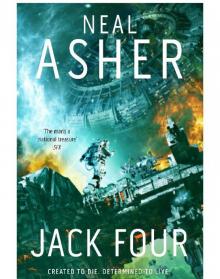 Jack Four
Jack Four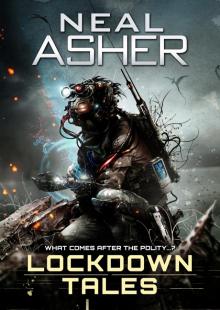 Lockdown Tales
Lockdown Tales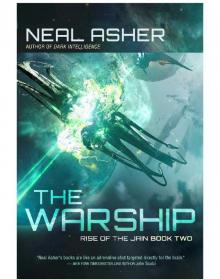 The Warship
The Warship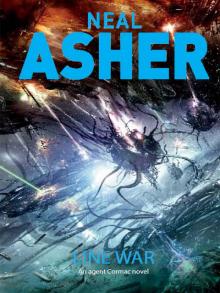 Line War
Line War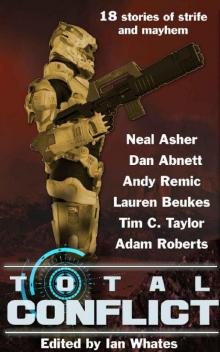 Total Conflict
Total Conflict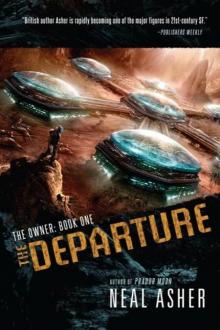 The Departure
The Departure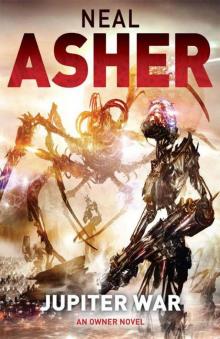 Owner 03 - Jupiter War
Owner 03 - Jupiter War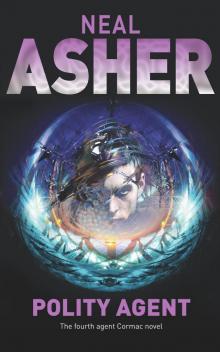 Polity Agent
Polity Agent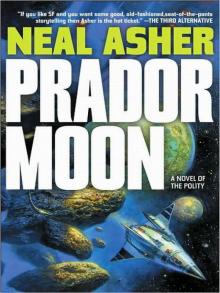 Prador Moon
Prador Moon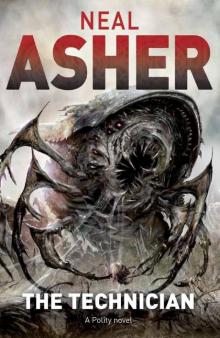 The Technician
The Technician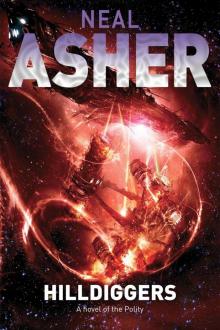 Hilldiggers
Hilldiggers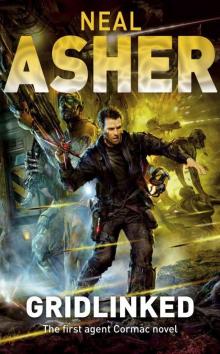 Gridlinked
Gridlinked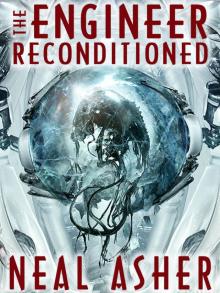 The Engineer ReConditioned
The Engineer ReConditioned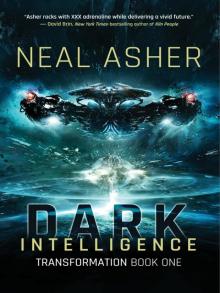 Dark Intelligence
Dark Intelligence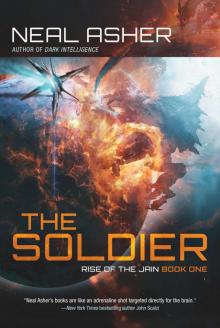 The Soldier: Rise of the Jain, Book One
The Soldier: Rise of the Jain, Book One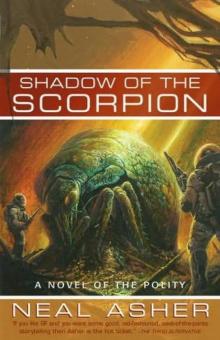 Shadow of the Scorpion p-2
Shadow of the Scorpion p-2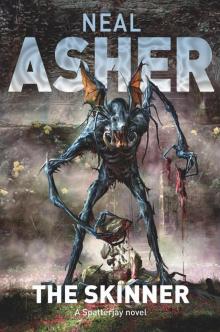 The Skinner
The Skinner The Soldier
The Soldier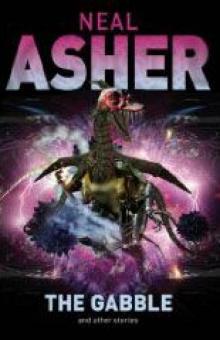 The Gabble p-13
The Gabble p-13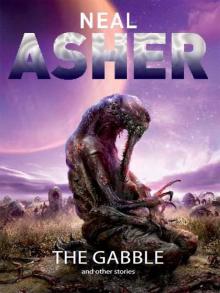 The Gabble and Other Stories
The Gabble and Other Stories The Parasite
The Parasite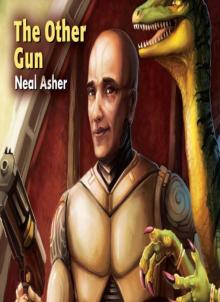 The Other Gun
The Other Gun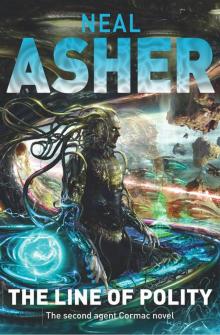 The Line of Polity
The Line of Polity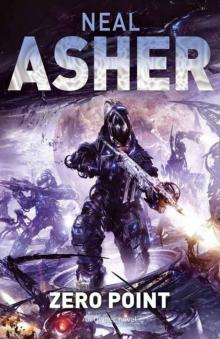 Zero Point (Owner Trilogy 2)
Zero Point (Owner Trilogy 2)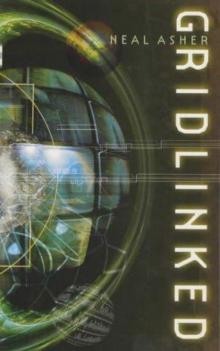 Gridlinked ac-1
Gridlinked ac-1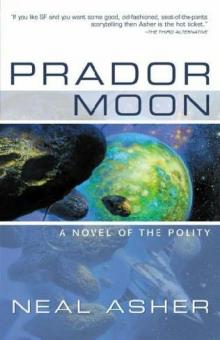 Prador Moon p-1
Prador Moon p-1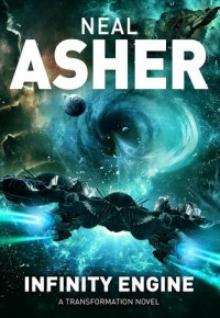 Infinity Engine
Infinity Engine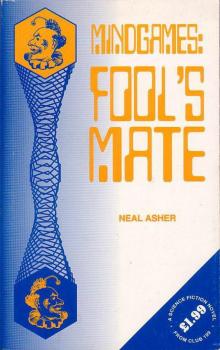 Mindgames: Fool's Mate
Mindgames: Fool's Mate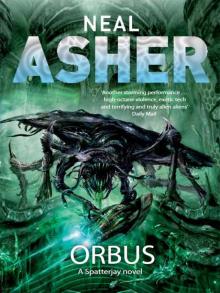 Orbus
Orbus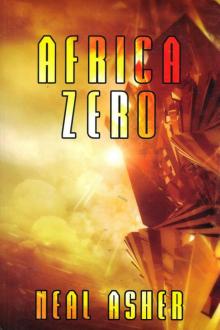 Africa Zero
Africa Zero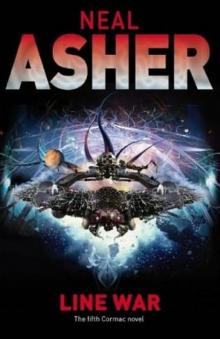 Line War ac-5
Line War ac-5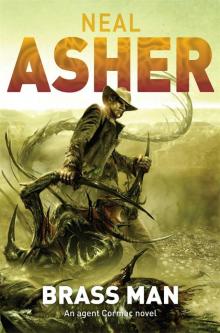 Brass Man
Brass Man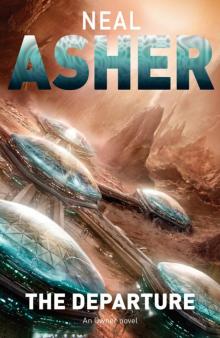 The Departure to-1
The Departure to-1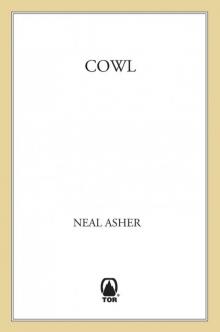 Cowl
Cowl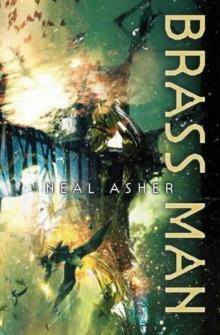 Brass Man ac-3
Brass Man ac-3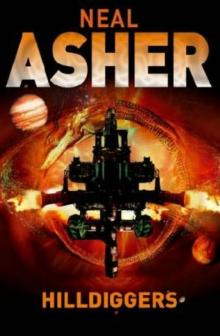 Hilldiggers (polity)
Hilldiggers (polity)![Greg Bear - [Eon Trilogy 1] - Eon (rescan) (v1.0) Read online](http://i1.bookreadfree.com/i2/04/08/greg_bear_-_eon_trilogy_1_-_eon_rescan_v1_0_preview.jpg) Greg Bear - [Eon Trilogy 1] - Eon (rescan) (v1.0)
Greg Bear - [Eon Trilogy 1] - Eon (rescan) (v1.0)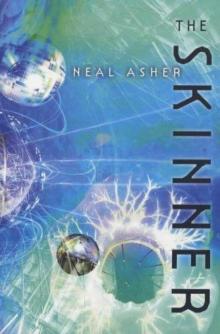 The Skinner s-1
The Skinner s-1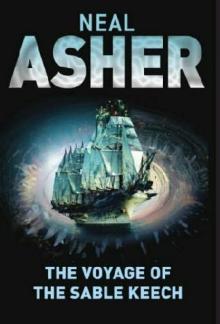 The Voyage of the Sable Keech s-2
The Voyage of the Sable Keech s-2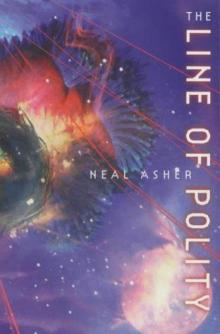 The Line of Polity ac-2
The Line of Polity ac-2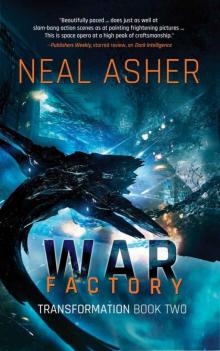 War Factory: Transformations Book Two
War Factory: Transformations Book Two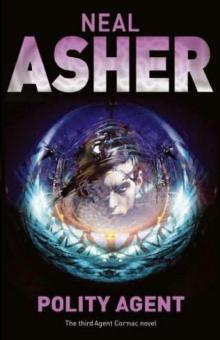 Polity Agent ac-4
Polity Agent ac-4